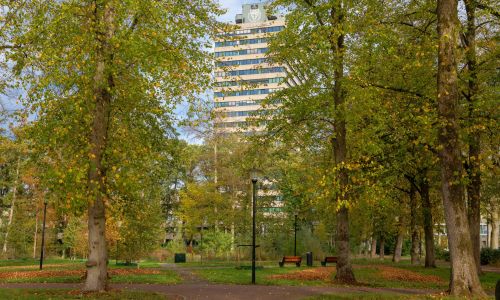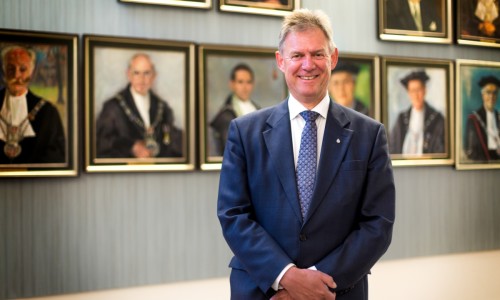Dozens of employees critical of former deans: ‘Their strong opinion has an intimidating effect’
-
 Foto: Dick van Aalst
Foto: Dick van Aalst
OPINION - Administrators are ‘fair game’, two former deans stated with concern last week after the premature resignation of Han van Krieken as rector. Dozens of university employees distance themselves from that message in this letter. According to the signatories, the former deans' words stand in the way of a nuanced discussion about social safety.
‘Public execution’, ‘the administrator is fair game’: former deans Lutgarde Buydens and Margot van Mulken do not shy away from using big words in their opinion piece that Voxweb published last Thursday in response to the resignation of Han van Krieken as rector magnificus of Radboud University. We, a number of concerned colleagues from different sections of the university, feel uncomfortable with the firm tone of their editorial article, which in our opinion does not do justice to the complexity and precarious character of the case.
Suggestive language
What are the facts? In January 2017, Han van Krieken made some sexually intimidating comments to a female employee of the university. She then filed a complaint, which an external committee declared to be justified after conducting an investigation. The university’s foundation board, at that time Van Krieken’s formal employer, followed the committee’s verdict and then gave the rector an official warning. The female employee was offered a follow-up procedure, but she eventually saw no other option than to resign. The whole case did not become public, until September 23rd, when newspaper De Gelderlander reported on it based on their own investigation.
In the opinion piece by Buydens and Van Mulken, these facts are given a rather subjective interpretation. The complaint that was declared to be well-founded is called an ‘anonymous allegation’. The involvement of the press makes the case a ‘public execution’, while the university ‘handled [the case] exceptionally well’, according to the authors. This is downright suggestive language, which rhetorically hints at a sharp distinction between the ‘good’ (the university’s administration) and the ‘bad’ (the press and the woman who filed the complaint).
Did the university’s foundation board really handle the complaint ‘exceptionally well’? It indeed set up an external committee and gave Van Krieken an official warning, but initially failed to mention it in the university’s annual report, only to include it three years later using highly veiled terms (‘1 complaint of an employee against another employee’).
Moreover, the ‘anonymous allegation’ was declared justified by an external committee. This is sufficient reason to take the complaint by the female employee seriously and it is also sufficient reason for the press to rightly bring the case forward, certainly if the university itself failed to do so. After all, this does not concern just any random employee, but the rector magnificus.
Position of authority
Buydens and Van Mulken of course have the right to express their opinion on this matter. As former administrators, they probably know like no other that high winds blow on high hills, and that women and men in high positions can also feel vulnerable. At the same time, we think that they are overlooking something important, namely that precisely their firm opinion, expressed from a position of authority, also has an intimidating effect, especially if this opinion is then supported publicly – in reactions below the opinion piece – by various employees in senior positions.
‘An editorial piece such as the one by Buydens and Van Mulken interferes, possibly unintentionally, with a nuanced discussion on social safety’
In the workshops on social safety that our university is currently organising, much attention is paid to the fact that this safety is first and foremost a systemic issue. That approach hits the nail on the head. People do not necessarily feel unsafe because of that one colleague who once made an inappropriate comment, but because of an organisational culture in which employees who call attention to such transgressive behaviour, risk becoming the target of scorn and insinuations themselves. It saddens us that the opinion piece of Van Mulken, Buydens, and their supporters gives the impression that increasing social safety at the university is secondary to limiting reputational damage to the university. Moreover, they suggest that making such misconduct public several years after the fact is unjust towards the perpetrator. In doing so, they show little regard for what is just for the victims of sexual intimidation.
An editorial piece such as the one by Buydens and Van Mulken interferes, possibly unintentionally, with a nuanced discussion on social safety. By claiming so firmly that an administrator has been victimized, they leave little room for open conversation on how we want to handle the always complicated mismatch between good intentions and bad consequences in our organisation. Van Krieken also had ‘no intention of coming across as sexually intimidating’, as he states in De Gelderlander. Even so, ‘that is unfortunately what happened’.
Kindly request
Feelings of unsafety are not always easy to capture. Yet perhaps an important indication is the following: that of the group writing this opinion piece, a considerable part wishes to remain anonymous, because they fear the adverse effects that signing a publicly critical note on a strong opinion of two former deans might have. A comparable fear of the possible negative consequences of addressing issues of social safety shows through in the investigative piece that De Gelderlander published on Saturday, September 30th. Based on their own research, the newspaper states that reporting transgressive behaviour at Radboud University is still discouraged and victims prefer to remain anonymous for fear of reprisals.
That is why we would like to kindly request the (former) administrators and their supporters to refrain from responding to this contribution with again a strong and firm condemnation, but rather with curiosity about and respect for the great discomfort that their opinion piece has caused us.
Signatories (listed alphabetically)
Stéfanie André (assistant professor)
Hanneke van Asperen (research employee)
Jan Bant (PhD candidate)
Ruud van den Beuken (assistant professor)
Shari Boodts (assistant professor and member of Radboud Young Academy)
Taco Brandsen (professor)
Marieke van den Brink (professor)
Susanne Brouwer (assistant professor)
Ilja Croijmans (assistant professor)
Serena Daalmans (assistant professor)
Evi Dalmaijer (PhD candidate)
Frederik van Dam (assistant professor and member of Radboud Young Academy)
Jeroen Dera (assistant professor and member of Radboud Young Academy)
Mark Dingemanse (associate professor and member of Radboud Young Academy)
Maarten van Doorn (lecturer)
Oscar Ekkelboom (PhD candidate)
Lize Glas (associate professor and member of Radboud Young Academy)
Sophie de Groot (system administrator and member of the Works Council for FNV)
Peter van der Heiden (assistant professor)
Jet Hoek (assistant professor)
Iris Hendrickx (assistant professor)
Jules van Horen (education support and member of the Works Council for FNV)
Aukje van Hout (lecturer and researcher)
Paul Hulsenboom (education developer and researcher)
Sanne Jongeling (PhD candidate)
Gaard Kets (assistant professor)
Shelena Keulemans (assistant professor)
Marie Keulen (PhD candidate)
Yung Han Khoe (PhD candidate)
Stella Koenen (PhD candidate)
Martijn de Koning (associate professor)
Katerina Manevska (assistant professor)
Fons Meijer (researcher)
Maurits Meijers (assistant professor)
Warda Nejjari (assistant professor)
Paul Nelissen (lecturer and former director of education)
Ivo Nieuwenhuis (assistant professor)
Chris Nijhuis (lecturer and PhD candidate)
Sophie van Os (PhD candidate)
Hester Paanakker (assistant professor)
Berber Pas (associate professor)
Tess Post (PhD candidate)
Paul Reef (lecturer and PhD candidate)
Lynn de Rijk (PhD candidate)
Emma Ringelberg (former student)
Anne Sadza (PhD candidate)
Mathijs van de Sande (assistant professor)
Dorian Schaap (assistant professor)
Anneloek Scholten (PhD candidate)
Tijs Sikma (PhD candidate)
Roel Smeets (assistant professor)
Niels Spierings (professor and member of Radboud Young Academy)
Liza Steultjens (PhD candidate)
Lars Stevenson (PhD candidate)
Anya Topolski (associate professor)
Maya Turolla (postdoctoral researcher)
Jorijn Verbruggen (student advisor)
Lieke Verheijen (assistant professor)
Anna van der Vleuten (professor)
Evert van der Zweerde (professor)
Clim Wijnands (PhD candidate)
Rowena Zweet (PhD candidate)
The letter was also signed by 25 employees who wished to remain anonymous. Their names are known to the Vox editorial team.



